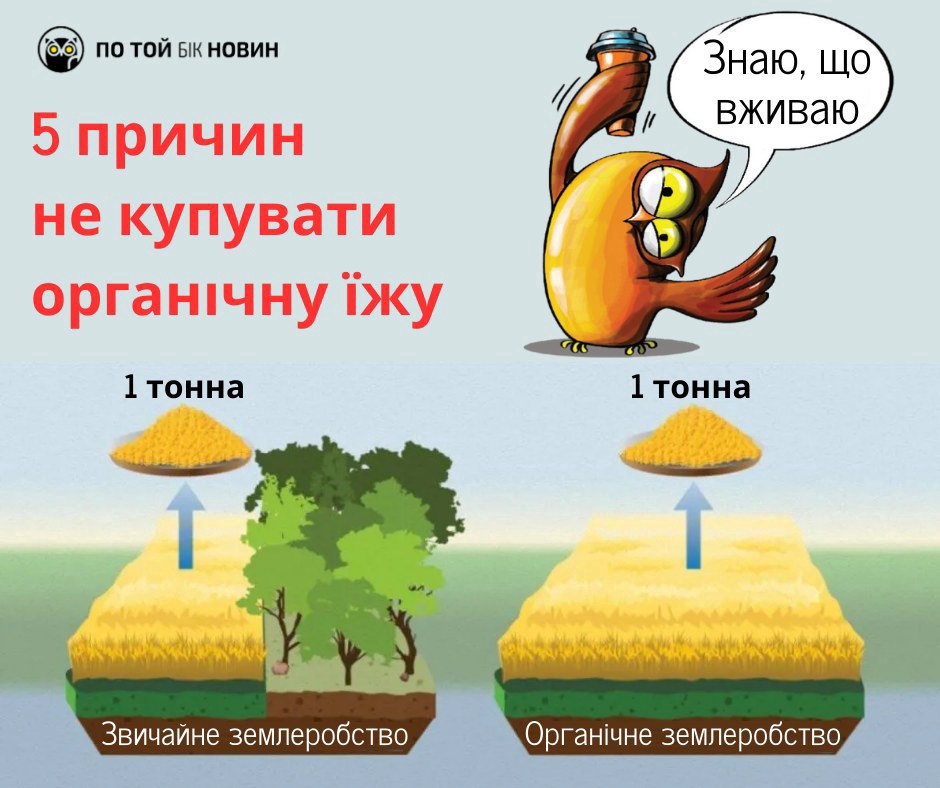5 reasons not to buy organic food produce

The alleged benefits of organic food, as claimed by marketers, are unfounded. Furthermore, if the dreams of organic farming advocates materialize, and the global population consumes organic products only, it could lead to a real disaster.

5 reasons not to buy organic food produce (the two pictures show some differences between conventional farming and organic farming
This was evident in Sri Lanka in 2021 when then-President Gotabaya Rajapaksa prohibited agrochemicals, compelling all farmers (27% of the country’s workforce) to adopt organic farming [1]. Consequently, the yields of various crops saw an average decline of 19-25%, with tea yields dropping by 20%. The government had to allocate hundreds of millions of dollars for compensations and subsidies to affected farmers.
The staple food in Sri Lanka, rice, which was previously produced in sufficient quantities and even exported, experienced a 20% decrease in yield. This led to a 50% increase in rice prices and a $450 million expenditure on imports [2]. Amid the pandemic, reduced tourism, and nature-centric initiatives, Sri Lanka’s economy collapsed, prompting Gotabaya Rajapaksa to resign following public protests.
This story serves as a wakeup call that the slogans of certain eco-activists and the green “organic food” labels may not be driven by good intentions but rather by ideological misconceptions and pseudoscience. To underscore this point, here are five reasons why you should avoid organic food.
⦁ Organic food is not healthier.
Numerous studies, both short and extensive, have been conducted, and those not sponsored by companies supporting organic farming consistently reach the same conclusion - there are no benefits for your health.
Let’s look at systematic reviews that summarize findings from hundreds and hundreds of studies. In 2012, one of the largest reviews (237 studies) demonstrated that organic foods are no better than conventional foods in terms of nutrient content or health advantages [3]. No disparities in vitamin content were identified, with only one nutrient - phosphorus - exhibiting higher levels in organic foods compared to conventional foods.
The researchers emphasize that since few people actually suffer from phosphorus deficiency, there’s really nothing to worry about. In a 2019 scientific review, researchers identified small benefits associated with the consumption of organic foods, although they were unable to determine whether these benefits were clinically significant. The conclusion was as follows: “based on the current evidence, we cannot conclude that there are long-term health benefits of eating organic food” [4].
⦁ Pesticides are used in organic agriculture.
Many people believe that organic farming avoids pesticide use, and therefore, food produce from organic sources is safer to consume than conventionally grown fruits and vegetables.
However, this notion is not true. Farmers want to feed people and not only fungi and insects, so they resort to insecticides and fungicides. The key distinction lies in the fact that organic farming primarily employs pesticides that are not synthetically produced.
Nevertheless, there’s no reason to believe that pesticides derived from natural sources are better or safer than synthetic ones. Many of these natural pesticides are even more toxic and less effective. For example, nicotine sulfate, which is toxic to warm-blooded animals, and highly toxic copper sulfate are among them [5].
It’s important to note that natural pesticides undergo less testing for safety and efficacy than synthetic ones. There is more comprehensive information available regarding safe levels and usage regulations for pesticides in conventional farming than in organic farming.
Despite this, the pesticide residues discovered by scientists on vegetables and fruits, both organic and conventional, are considered to be very much below danger levels [6]. If you’re concerned about potential residues, the FDA recommends the simple and economical method of washing fruits and vegetables under running water [7].
⦁ Organic farming causes more environmental damage.
Depending on the plants and the region, organic farming typically results in 20-60% lower yields compared to conventional farming, necessitating more land, energy, labour, and water for equivalent yields.
This situation raises several significant issues:
Firstly, we already use prime land for farming. Farming expansion could encroach on territory that is more conducive to the growth of forest or meadow plants than corn, for instance.
Secondly, there is the issue of surface and groundwater pollution. In conventional agriculture, nitrogen is derived from synthetic fertilizers, whereas organic farms utilize manure for nitrogen production. The nutrient release mechanisms differ between these systems, and manure falls short in terms of benefits.
Excess nutrients from manure, unabsorbed by crops, can leach from farmland into rivers and lakes, resulting in higher nutrient pollution from organic farms compared to conventional ones. This leads to eutrophication (enriching water bodies with nutrients and destroying water productivity-ed). Additionally, manure carries dangerous pathogens such as E. coli.
Unfortunately, there have been instances in history where consuming food from organic farms led to serious harm. In 2011, Europe experienced a food poisoning outbreak that affected nearly 4,000 people, with 53 fatalities [8].
In 2017, scientists Michael Clark and David Tilman reviewed 742 agricultural systems to assess the environmental impact of organic and conventional farming. The results, depicted in the graph below [9], show that anything above the horizontal line indicates where organic systems fall short. They necessitate more land and energy, contribute to increased pollution, and, at best, do not aid in reducing CO2 emissions.
Furthermore, organic farming strictly prohibits the use of genetically modified organisms (GMOs). It’s an ironclad fact that GMOs have the potential to enhance yields, enable more crops to fix nitrogen compounds from the air, and reduce the need for additional land.
Rejecting the achievements of genetic engineering is entirely irrational. In conclusion, environmentalists should advocate for modern farming methods rather than endorsing organic farming.
⦁ Organic products are more expensive.
According to a 2021 Ukrainian study [10], the average prices for organic products in the country were three times higher than those for conventional products. For instance, the price of organic oatmeal was 574.8% higher, organic rice - 412.5% higher, organic corn sticks - 387.9% higher, and organic buckwheat flour - 260% higher.
Various factors contribute to this overpricing, including lower fertility, increased harvesting costs, and sellers’ and farmers’ belief in better quality, etc. It’s widely agreed that we need to eat more fruit and vegetable and that they should be available at affordable prices to all segments of the population. But, promoting the sale of more expensive and not actually better organic products is deemed a direct harm to society. Although wealthier individuals can continue to live in the illusion of eco-consciousness and indulge in expensive organic foods, the poorest segments of the population will face difficulties in the absence of alternatives.
⦁ Organic food does not taste better.
It is acknowledged that biases can influence perceptions, including those related to food. While advocates of organic food may subjectively believe it tastes better than conventional food, this happens only when they are aware of what they are consuming.
Numerous studies have demonstrated that in blind tastings, individuals could not discern the difference between organic and conventional products [11]. If a tomato from an organic farm 20 kilometres away is perceived as more flavourful and juicier than a tomato brought in from another region or country, it’s more likely that the variety of the tomato, rather than its cultivation method, played a role.
Unfortunately, transporting juicy vegetables over long distances is challenging due to their rapid spoilage. Sometimes, in the breeding process, certain product characteristics must be sacrificed for extended shelf life, making these products available to a wider audience for a more extended period of time.
There is no reliable evidence supporting the notion that organically grown food is more nutritious or healthier. According to scientific findings, organic food is losing its marketing advantages. In 1960, the global population stood at approximately 3 billion people, and today it has reached 8 billion. An interesting fact is that in the 21st century, we use three times less land for farming than in the mid-twentieth century.
One might expect the opposite given the nearly tripled population, but that’s not the case. This shift is attributed to advancements in the scientific and technological processes. Years of progress in agricultural production, including synthetic fertilizers and pesticides, GMOs, and the Green Revolution, have played a crucial role in feeding and saving a significant number of people from death. It is imperative not to undermine these achievements by succumbing to the false assumption that natural is good and unnatural is bad. If unscrupulous marketing, modern-day Luddism, and pseudoscience prevail, it could have profound consequences for global poverty and environmental protection.
Prepared by Dmytro Filipchuk
References:
⦁ https://www.vox.com/.../sri-lanka-organic-fertilizer...
⦁ https://foreignpolicy.com/.../sri-lanka-organic-farming.../
⦁ https://www.acpjournals.org/.../0003-4819-157-5-201209040...
⦁ https://www.ncbi.nlm.nih.gov/pmc/articles/PMC7019963/
⦁ https://www.ecfr.gov/.../subchapter-M/part-205/subpart-G
⦁ https://efsa.onlinelibrary.wiley.com/.../sp.efsa.2018.EN...
⦁ https://geneticliteracyproject.org/.../scientists-rebuke...
⦁ https://en.wikipedia.org/.../2011_Germany_E._coli_O104:H4...
⦁ https://ourworldindata.org/is-organic-agriculture-better...






